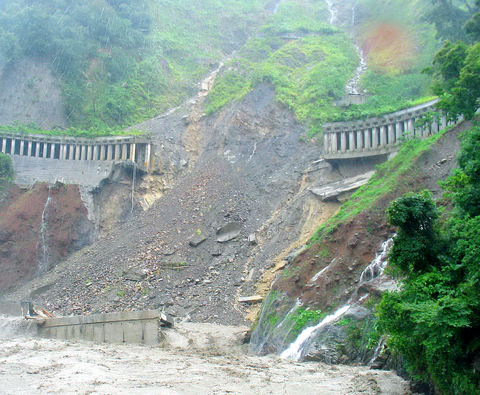The edge of Typhoon Matsa moved away from Taiwan by midnight last night, but Central Weather Bureau officials warned residents in the north and mountainous areas in center and the south to stay alert for mudslides.
With a radius of 250km, Matsa, the second typhoon to hit the country this year, was moving north-northwest away from Taiwan toward China at 14kph.
No casualties had been reported as of press time last night, but the torrential rain and strong winds brought by the medium-strength storm caused landslides in the north and center of the country, blocking roads, washing away bridges and forcing the evacuation of more than 1,000 people.

PHOTO: TAIPEI TIMES
Several hundred people were trapped in mountain areas after mudslides blocked roads.
LAND WARNINGS LIFTED
The weather bureau lifted its land warnings for the typhoon at 9pm last night, when the epicenter of the storm was 260km north-northwest of Taipei.
"Mountainous areas in the center and south need to brace for heavy rains through Sunday," said Lin Hsiu-wen (
Matsa brought 1,400mm of rain to mountainous areas in Hsinchu and Miaoli counties, and 1,200mm in Taoyuan County, exceeding the bureau's forecast, officials said.
Matsa's maximum sustained winds were 144kph with gusts of up to 180kph.
Matsa wreaked havoc with power supplies, leaving 56,211 households in the dark. As of 6:30pm yesterday, the Taiwan Power Co had restored electricity to 52,101 households, the company said on its Web site.
WATER PROBLEMS
The torrential rains polluted water supplies and damaged pipelines, causing water shortages for more than 80,000 households in Hsinchu. Water shortages were also experienced in Taoyuan County after water turbidity in the Shihmen Dam (石門水庫) reached 25,000 NTU (nephelometric turbidity units), the Water Resources Agency said.
The Taiwan Water Corp has promised to restore water supplies as soon as possible, and set up several temporary supply stations in the affected areas.
Agricultural production, still reeling from Typhoon Haitong, was battered again. Statistics released by the Council of Agriculture yesterday afternoon showed losses of NT$36.49 million (US$1.14 million).
To stabilize the supply of vegetables, the council has released frozen vegetables from its stocks and coordinated the release of more with other organizations, the council said in a statement.
Air traffic, which was disrupted by the typhoon yesterday, will be restored today, airlines said.
Meanwhile, nearly 600,000 people were evacuated yesterday in Zhejiang Province as China braced for Matsa's arrival. The typhoon was expected to make landfall near Wenzhou city in Zhejiang late last night or early today, Chinese meteorologists said.
Chinese state media predicted it would be the worst storm to hit Shanghai in nearly a decade and flood prevention officials urged residents living on the shore in suburban areas to evacuate.
also see story:
Officials reassure skittish public over veggies

Intelligence agents have recorded 510,000 instances of “controversial information” being spread online by the Chinese Communist Party (CCP) so far this year, the National Security Bureau (NSB) said in a report yesterday, as it warned of artificial intelligence (AI) being employed to generate destabilizing misinformation. The bureau submitted a written report to the Legislative Yuan in preparation for National Security Bureau Director-General Tsai Ming-yen’s (蔡明彥) appearance before the Foreign Affairs and National Defense Committee today. The CCP has been using cognitive warfare to divide Taiwanese society by commenting on controversial issues such as Taiwan Semiconductor Manufacturing Co’s (TSMC, 台積電) investments in the

HELPING HAND: The steering committee of the National Stabilization Fund is expected to hold a meeting to discuss how and when to utilize the fund to help buffer the sell-off The TAIEX plunged 2,065.87 points, or 9.7 percent, to close at 19,232.35 yesterday, the highest single-day percentage loss on record, as investors braced for US President Donald Trump’s tariffs after an extended holiday weekend. Amid the pessimistic atmosphere, 945 listed companies led by large-cap stocks — including Taiwan Semiconductor Manufacturing Co (TSMC, 台積電), Hon Hai Precision Industry Co (鴻海精密) and Largan Precision Co (大立光) — fell by the daily maximum of 10 percent at the close, Taiwan Stock Exchange data showed. The number of listed companies ending limit-down set a new record, the exchange said. The TAIEX plunged by daily maxiumu in just

INVESTIGATION: The case is the latest instance of a DPP figure being implicated in an espionage network accused of allegedly leaking information to Chinese intelligence Democratic Progressive Party (DPP) member Ho Jen-chieh (何仁傑) was detained and held incommunicado yesterday on suspicion of spying for China during his tenure as assistant to then-minister of foreign affairs Joseph Wu (吳釗燮). The Taipei District Prosecutors’ Office said Ho was implicated during its investigation into alleged spying activities by former Presidential Office consultant Wu Shang-yu (吳尚雨). Prosecutors said there is reason to believe Ho breached the National Security Act (國家安全法) by leaking classified Ministry of Foreign Affairs information to Chinese intelligence. Following interrogation, prosecutors petitioned the Taipei District Court to detain Ho, citing concerns over potential collusion or tampering of evidence. The

‘COMPREHENSIVE PLAN’: Lin Chia-lung said that the government was ready to talk about a variety of issues, including investment in and purchases from the US The National Stabilization Fund (NSF) yesterday announced that it would step in to staunch stock market losses for the ninth time in the nation’s history. An NSF board meeting, originally scheduled for Monday next week, was moved to yesterday after stocks plummeted in the wake of US President Donald Trump’s announcement of 32 percent tariffs on Taiwan on Wednesday last week. Board members voted to support the stock market with the NT$500 billion (US$15.15 billion) fund, with injections of funds to begin as soon as today. The NSF in 2000 injected NT$120 billion to stabilize stocks, the most ever. The lowest amount it